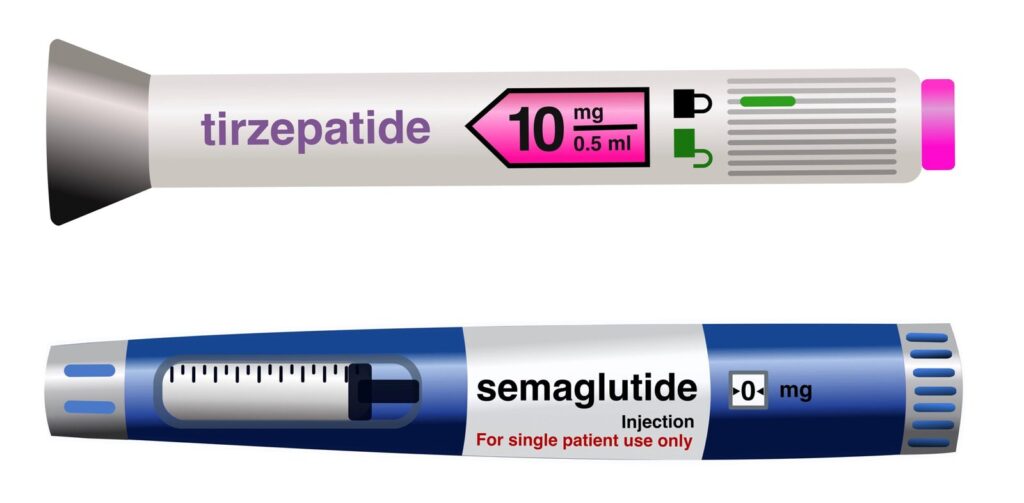
As with any medical treatment, weight loss injections come with their own set of risks. It’s essential to understand the potential side effects and who should avoid them to make an informed decision about whether they’re right for you.
Introduction
- What Are Weight Loss Injections?
- Why Are Weight Loss Injections Popular?
Understanding the Risks of Weight Loss Injections
- Safety Concerns and Side Effects
- Who Should Avoid Weight Loss Injections?
Types of Weight Loss Injections
- Lipotropic Injections
- Human Chorionic Gonadotropin (HCG) Injections
- GLP-1 Agonists (like Semaglutide)
Evaluating the Effectiveness of Weight Loss Injections
- How Weight Loss Injections Work
- How Long Does It Take to See Results?
Factors to Consider Before Using Weight Loss Injections
- Health Conditions to Be Aware Of
- Consulting with Healthcare Professionals
- Potential Drug Interactions
Are Weight Loss Injections FDA-Approved?
- Understanding FDA Regulations
- The Importance of FDA-Approval for Safety
Weighing the Benefits and Drawbacks
- Advantages of Weight Loss Injections
- Disadvantages of Weight Loss Injections
Alternatives to Weight Loss Injections
- Natural Weight Loss Options
- Diet and Exercise for Effective Weight Loss
Success Stories and Testimonials
- Real Life Experiences with Weight Loss Injections
- What Do Experts Say?
Conclusion
- Final Thoughts on Weight Loss Injections
- Safety Tips for Effective Weight Loss
FAQs
- What are the common side effects of weight loss injections?
- How much weight can I lose with weight loss injections?
- Are weight loss injections safe for everyone?
- How long do weight loss injections last?
- Where can I find FDA-approved weight loss injections?
How to Determine if Weight Loss Injections Are Safe
When it comes to weight loss, many individuals are looking for quicker, more convenient ways to shed pounds. Among the various options, weight loss injections have gained significant attention. These injections promise to help accelerate fat loss, but with the rising popularity comes a slew of questions about their safety and effectiveness. If you’re considering weight loss injections, it’s crucial to understand how they work, the potential risks, and how to determine if they’re safe for you.
What Are Weight Loss Injections?
Weight loss injections are products that are injected into the body to promote fat loss. These injections are designed to target fat and can help reduce body weight by increasing fat metabolism, suppressing appetite, or improving fat breakdown. The injections are often used in conjunction with a healthy diet and exercise plan to optimize weight loss results.
Why Are Weight Loss Injections Popular?
Weight loss injections are popular because they offer a more immediate solution for those struggling to lose weight. Many people want to see quick results, and injections seem like a faster route. Furthermore, as injectable treatments become more common in cosmetic procedures (like Botox), there is a growing belief that these injections may offer a more effective, less invasive method of weight loss compared to oral medications or other treatments.
Understanding the Risks of Weight Loss Injection
As with any medical treatment, weight loss injections come with their own set of risks. It’s essential to understand the potential side effects and who should avoid them to make an informed decision about whether they’re right for you.
Safety Concerns and Side Effects
While many people report positive results, weight loss injection can cause side effects, including nausea, dizziness, or more severe issues like allergic reactions, blood clotting, and changes in blood pressure. Some injections, especially those that involve hormone manipulation, can have long-term effects on your metabolic health.
Who Should Avoid Weight Loss Injection?
People with certain health conditions should avoid weight loss injection, particularly those with heart disease, diabetes, or thyroid problems. It’s important to have a conversation with your doctor to assess whether this treatment is suitable based on your medical history.
Types of Weight Loss Injection
There are several types of weight loss injections available on the market today. Each type works in different ways to support weight loss, and knowing the difference is crucial to understanding which might be right for you.
Lipotropic Injections
Lipotropic injections include a blend of compounds designed to break down fat and improve your metabolism. These include ingredients like B12, which helps with energy levels, and amino acids, which are involved in fat burning. The injections are usually administered weekly to promote fat loss, often in combination with exercise and a balanced diet.
Human Chorionic Gonadotropin (HCG) Injections
HCG injections are derived from a hormone produced during pregnancy. They work by reducing hunger and promoting fat burning. Though some studies suggest they can help with weight loss, others have raised concerns about their effectiveness and the safety of using HCG for long periods. The FDA does not approve HCG for weight loss, and many experts advise caution.
GLP-1 Agonists (like Semaglutide)
GLP-1 agonists are one of the newest classes of weight loss injection. These medications, such as Semaglutide, are designed to mimic a hormone that helps regulate blood sugar and appetite. They have been proven to help people lose weight by controlling hunger and boosting insulin sensitivity. GLP-1 agonists have shown promise in clinical trials, but like any medication, they may have side effects.
Evaluating the Effectiveness of Weight Loss Injections
The effectiveness of weight loss injection can vary from person to person. Factors like lifestyle, diet, and exercise play a crucial role in how successful these injections will be.
How Weight Loss Injections Work
Weight loss injections typically work by increasing your body’s metabolism or decreasing appetite. Some injections, like those involving B12 and lipotropic compounds, aim to break down fat and convert it into energy. Others, such as GLP-1 agonists, work by regulating hunger hormones and insulin production.
How Long Does It Take to See Results?
While some individuals report seeing noticeable results within the first few weeks, others may take longer. Generally, for weight loss injections to show results, they should be combined with a healthy lifestyle, including a balanced diet and regular exercise. Without these components, the injections alone may not produce significant weight loss.
Factors to Consider Before Using Weight Loss Injections
Before using weight loss injection, it’s important to consider several factors to ensure they’re safe and suitable for your needs.
Health Conditions to Be Aware Of
If you have a pre-existing health condition, it’s critical to talk to your doctor. Conditions like heart disease, diabetes, or thyroid problems can affect the way your body responds to weight loss injection. Your doctor can help you determine whether you should proceed with this treatment.
Consulting with Healthcare Professionals
Consulting with a healthcare professional before starting weight loss injection is a must. They will assess your health history, discuss potential side effects, and recommend the best course of action based on your goals and overall health.
Potential Drug Interactions
Certain medications can interact with weight loss injection, which could lead to side effects or complications. If you’re currently on prescription medication, let your healthcare provider know to ensure the injection doesn’t interfere with your treatments.
Are Weight Loss Injections FDA-Approved?
One of the most important factors in determining whether a weight loss injection is safe is whether it’s approved by the FDA. The FDA regulates medications to ensure that they are safe and effective. However, many weight loss injections are not FDA-approved, which can lead to potential risks.
Understanding FDA Regulations
The FDA does not approve all weight loss injection. In some cases, companies sell injections that have not undergone thorough clinical trials to confirm their safety. It’s essential to research whether the product you’re considering has FDA approval before proceeding.
The Importance of FDA-Approval for Safety
FDA-approved weight loss injection undergo rigorous testing to ensure they are safe for public use. When a product is FDA-approved, you can be confident that it has been evaluated for both safety and effectiveness. Without this approval, there is no guarantee that the injection will work as claimed or that it won’t cause harmful side effects.
Weighing the Benefits and Drawbacks
Before diving into any weight loss method, it’s important to carefully assess its pros and cons. Weight loss injection, while effective for some, come with both benefits and drawbacks that need to be considered based on individual goals, health status, and lifestyle. Let’s take a closer look at both the advantages and disadvantages to help you make an informed decision.
Advantages of Weight Loss Injections
- Fast Results
One of the main selling points of weight loss injections is the speed at which they can work. For many individuals who have struggled with weight loss for years, injections can provide a quicker alternative compared to traditional methods. These injections are designed to target fat cells and boost metabolism, leading to faster weight loss results. Some people notice visible changes in a short period of time, making them appealing for those who want to see immediate progress. - Convenience
Weight loss injections are convenient and easy to use, especially for people who may not have time to commit to daily diet plans or exercise routines. Injections are typically administered on a set schedule, either weekly or biweekly, which can be a time-saver. They also offer a “set it and forget it” approach that requires less effort in terms of continuous planning, unlike traditional weight loss methods that require ongoing discipline in terms of meal prep or exercise consistency. - Targeted Fat Loss
Some weight loss injections are designed to specifically target fat cells. For instance, lipotropic injections contain compounds that help break down fat and convert it into energy. This targeted approach can result in fat loss that is more concentrated around certain areas of the body, such as the abdomen, where many people struggle the most. This can be a major draw for individuals looking for localized fat reduction. - Appetite Suppression
Another benefit is the appetite-suppressing effect of certain weight loss injection. GLP-1 agonists, like Semaglutide, help reduce hunger signals and cravings, making it easier for individuals to maintain a calorie deficit. This is particularly helpful for people who have trouble controlling their hunger or struggle with emotional eating. With reduced appetite, the likelihood of overeating and indulging in unhealthy foods is significantly decreased, making it easier to stick to a weight loss plan. - Metabolism Boost
Many weight loss injection, such as lipotropic and B12 injections, are designed to give your metabolism a boost. These injections may help you burn more calories and fat during the day, even while at rest. For individuals who find it difficult to lose weight due to a sluggish metabolism, these injections can offer an effective solution by increasing fat burning and energy levels. - Medical Supervision
Since weight loss injections often require a prescription and are typically administered by a healthcare professional, you can receive medical supervision during the process. This ensures that any potential complications or side effects can be monitored and addressed. A healthcare provider can also personalize the treatment, adjusting the injections as needed to optimize results while minimizing risks.
Disadvantages of Weight Loss Injections
- High Cost
One of the biggest drawbacks of weight loss injections is the cost. These treatments can be expensive, especially if you need multiple sessions over time. The price may not be covered by insurance, and for long-term use, the cost can add up quickly. For many individuals, the financial burden of weight loss injections may outweigh the benefits, especially when compared to other methods like diet and exercise that are much more affordable. - Short-Term Results
While weight loss injections can provide quick results, these results may be temporary if not maintained with a healthy lifestyle. Once you stop using the injections, there’s a high chance that the weight may return if the root cause of weight gain, such as poor eating habits or lack of exercise, isn’t addressed. The long-term effectiveness of these injections is highly dependent on maintaining a proper diet and exercise routine, meaning they may not be a sustainable solution for long-term weight loss. - Side Effects
As with any medical treatment, weight loss injections come with the potential for side effects. Common side effects include nausea, fatigue, dizziness, and irritation at the injection site. More serious side effects can occur depending on the type of injection, such as heart palpitations, high blood pressure, or allergic reactions. The risk of these side effects can be a deterrent for individuals considering weight loss injections, especially if they have pre-existing health conditions. Consulting with a healthcare professional is essential before starting any injection treatment to ensure that it’s safe for your specific health status. - Invasive Treatment
Weight loss injections, being injections, involve a level of invasiveness that some individuals may find off-putting. The thought of regularly injecting themselves or visiting a clinic for injections may be intimidating or uncomfortable for many people. For those who are not comfortable with needles or who prefer non-invasive weight loss solutions, this could be a significant disadvantage. - Not Suitable for Everyone
Weight loss injections are not appropriate for everyone. People with certain medical conditions, such as heart disease, diabetes, or thyroid disorders, may be at an increased risk when using these injections. It’s also not recommended for pregnant or breastfeeding women. The injections should only be used under the guidance of a healthcare provider, who will evaluate whether they are a safe option based on an individual’s medical history. If you have any concerns, it’s important to consult a doctor before considering weight loss injections. - Dependency on Injections
Relying on injections for weight loss may create a psychological dependency on the treatment. Some people may become fixated on using injections as their primary method of weight loss, without making necessary lifestyle changes, such as improving their diet or exercise habits. This can result in a vicious cycle of using injections without making any real, lasting changes to overall health, which may lead to regaining the weight once the injections stop. - Lack of Long-Term Data
Another disadvantage of weight loss injections is the lack of long-term studies on their safety and effectiveness. While some injections have shown positive results in clinical trials, there is still limited data on the long-term effects of using these injections. This can make some people hesitant to use them, especially if they are concerned about unknown risks that may not become apparent until after extended use.
Alternatives to Weight Loss Injection
If you’re not ready for weight loss injection or prefer natural options, there are plenty of alternatives to consider.
Natural Weight Loss Options
You can achieve weight loss naturally by focusing on a healthy diet and exercise. Increasing your physical activity and eating a balanced diet rich in fruits, vegetables, and lean proteins can help you achieve your weight loss goals without injections.
Diet and Exercise for Effective Weight Loss
Diet and exercise should always be your first line of defense when it comes to weight loss. Not only is it more sustainable, but it also promotes overall health. The combination of a healthy, calorie-controlled diet and regular exercise is the most effective way to lose weight and keep it off in the long run.
Success Stories and Testimonials
Many individuals have found success with weight loss injections, but it’s essential to read real-life experiences and expert opinions before deciding.
Real Life Experiences with Weight Loss Injections
Testimonials from people who have used weight loss injection can provide valuable insights. Some individuals report significant weight loss and improved confidence, while others experience side effects or unsatisfactory results.
What Do Experts Say?
Experts caution against relying solely on injections for weight loss. While injection can provide short-term results, long-term success requires lifestyle changes, including diet and exercise. Consulting with a healthcare professional is crucial before beginning any weight loss regimen.
Read Also “Weight Loss Surgery: Options, Risks, and Benefits” Top Secret.
Conclusion
Weight loss injection can be an effective option for individuals struggling to lose weight. However, they come with potential risks and are not suitable for everyone. Before considering weight loss injection, it’s essential to consult with a healthcare professional to ensure that they are safe for you. Remember, the best results come when these injections are combined with a healthy lifestyle.
FAQs
- What are the common side effects of weight loss injections?
Common side effects include nausea, dizziness, and allergic reactions. Severe reactions may include blood clots or heart problems. - How much weight can I lose with weight loss injection?
Results vary, but many people see significant weight loss within weeks if they follow a healthy diet and exercise plan. - Are weight loss injections safe for everyone?
No, individuals with heart disease, diabetes, or thyroid issues should avoid them. Always consult with a doctor first. - How long do weight loss injection last?
The effects typically last for several weeks to months, but the long-term success depends on maintaining a healthy lifestyle. - Where can I find FDA-approved weight loss injection?
FDA-approved weight loss injections are available through licensed healthcare providers. Always check for FDA approval before using any injection.








One Comment